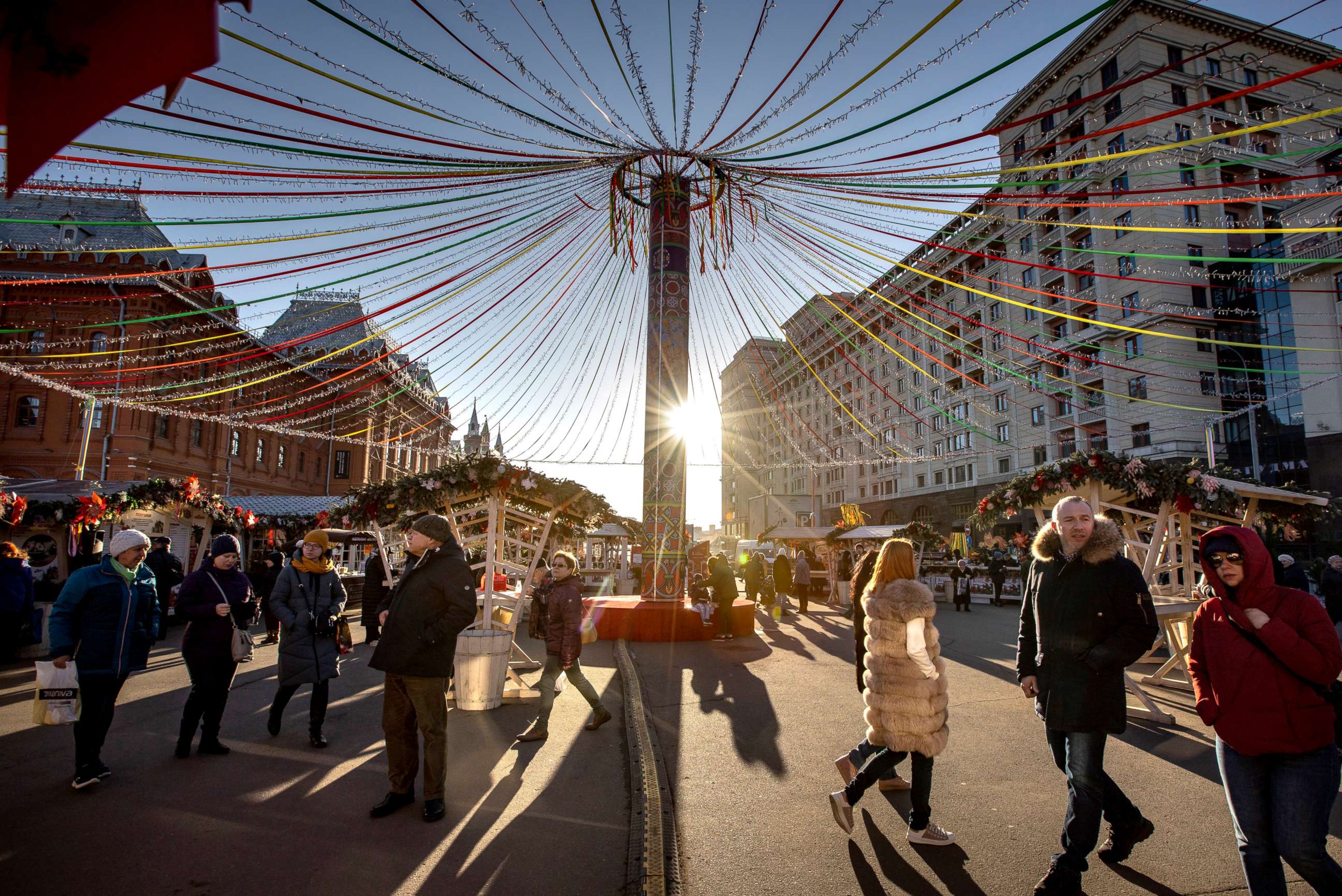In Moscow, people adjust to a winter without snow: 'It's like we're at a resort'
The Russian capital has seen almost no snow amid record warm temperatures
MOSCOW -- For months, people in Moscow have been adjusting to an unfamiliar type of winter -- one with hardly any snow.
Typically buried in several feet each winter, Russia’s capital this year has remained mostly snow free as temperatures have barely dipped below zero.
Last December and this January were the hottest ever recorded in Moscow. Temperatures again soared in February, last week breaking records for warmth on five consecutive days, reaching 44 degrees Fahrenheit. The first heavy snowfall arrived mid-January, two or three months later than usual, and after just a few weeks, quickly melted away.
In February, usually the coldest and snowiest month of the year, there is barely a patch of ice to be seen. Instead of nose-biting cold -- where below 5 degrees is ordinary-- people have been marveling at spring-like weather.
"What we have had this winter, you can't call winter," Tatiana Pozdnyakova, chief specialist at the Moscow Meteo-Office told the state-run news agency RIA Novosti this week. "Because the temperatures for the whole season have been almost all ... plus or just below zero. We don't know -- has winter started or have we jumped straight from autumn to spring?"
Few Muscovites can remember a winter like this one. Around the New Year holidays, authorities had to import snow into the city center for a snowboarding competition. Although snow periodically comes late in Moscow, it's all but unheard of for there to be so little and for temperatures to remain so persistently high.
Moscow’s last similarly snow-free winter was during the 1960s. Although snow periodically comes late in Moscow, it's all but unheard of for there to be so little and for temperatures to remain so persistently high. Meteorologists have warned there may yet be some freezes left in March, but the winter is essentially over.
The anomalous weather is part of a global heatwave that is on course to make this the warmest winter on record worldwide. In the U.S., temperatures are almost 3 degrees Celsius above the 20th-century average, while Europe experienced its warmest recorded January, according to the European Union’s Copernicus Climate Change Service.
From across Russia and Scandinavia, to Australia, where extreme heat is fueling devastating fires, and Antarctica, where temperatures rose above 20 degrees Celsius for the first time, the strange weather has worried scientists and stokes fears about climate change.
In Moscow, the lack of snow has been disconcerting.
In the city’s famous Gorky Park last Sunday, when temperatures reached a record 44.6 degrees, people strolled around enjoying the mild temperatures under a blazing spring sun. A giant polar bear, with plastic snow around its feet, stood looking marooned at the entrance of the park. The vast ice rink that is set up each year and forms a network of tracks along the park’s avenues was fenced off and melting.
“I can hardly believe it,” said Natalia Kirilova, 72, walking with four other pensioners. Neither she or they could remember a winter like it.
“It’s like we’re at a resort!” said Asya Metnova, 38, who had travelled from Udmurtia, a much colder region in central Russia.
Scientists have linked the warm winter worldwide to an unusual weather pattern in the Arctic. Winters in the northern hemisphere are strongly affected by a phenomenon known as the "Arctic Oscillation," which refers to swings between high and low pressure over the Arctic. During periods of high pressure, cold air from the top of the world escapes south, bringing wintry temperatures. But this year, an extreme low pressure system has settled for an abnormally long time over the North Pole, keeping the cold air trapped.

While it's unknown what is causing the unusually persistent low pressure system, it will likely become the subject of research for scientists investigating whether the pattern is connected with climate change.
Global temperatures have been rising for decades and the last six years have been the warmest since recorder have been kept. Scientists have warned that rising temperatures not only mean higher chance of warmer winters, but also more volatile and extreme weather.
Many in Moscow said they believed this year’s weird winter was linked to climate change. For years, Muscovites have remarked that winters have become warmer, and older people note the brutal colds of their youth now rarely happen. At the same time, recent summers have become unusually cold with storms more frequent. Last winter, Moscow had record levels of snowfall, the heaviest in a century.
Within the city, it has become to hear people musing whether Moscow will now have a "European winter," like those in London or Paris.
"From the point of view of one person, it’s nice. I don’t miss the snow, dirty boots!," said Anna Volkova, a 34-year-old psychologist. But, "it’s frightening from the point of view that you understand that something is going on with our Earth," she added.
For some, the lack of snow has been depressing. Instead of the clear, sparkling days that sub-zero temperatures can bring, residents have endured long weeks of dreary damp and clouds. Others have missed winter sports like cross-country skiing and ice skating.
"The kids would have liked to have skated more," said Natalya Policheva, 41, while walking with her young son, who was disappointed by the melting ice rink. "People are saying a European winter is more optimal," she said. But she said she had missed real frost.
"Winter should be icy and snowy," she said.




